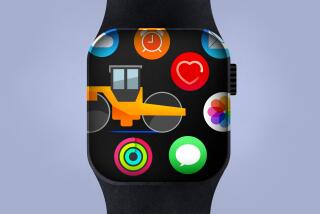Apple-IBM Pact May Send in the Clones
- Share via
In response to popular demand, The Cutting Edge today debuts a bimonthly column devoted to the Apple Macintosh. Columnist Charles Piller, a senior editor at MacWorld magazine, is the author of two books and has won more than two dozen awards for his distinguished reporting about Apple, the Macintosh and the effects of technology on public policy.
*
Those of us who waited years for Macintosh clones--with their promise of diversity, low prices and innovation--were elated when in late 1994 Apple finally agreed to permit them. Since then, though, Apple’s licensing efforts have bordered on pathetic. Only a handful of companies--and not a major PC maker among them--have been signed up to build Mac compatibles, and thus cloning has done little to vault the Mac forward in the PC wars.
With luck this will soon begin to change. Apple and IBM announced today that IBM will be able to sub-license the Mac operating system to buyers of its PowerPC central processors. As part of the deal, IBM will provide computer manufacturers with all the technical support they need to jump into the Mac-compatible market--a huge incentive for potential clone makers who know and trust IBM and may be leery of relying on Apple.
But even if the clone market never grows large, clones are already great for consumers, and here’s why:
* Choice: Even now, with Power Computing Corp. as the lone mainstream clone competitor, there are many more Macs to choose from. Using the mail-order model perfected in the PC market, Power Computing offers custom systems instead of the father-knows-best prepackaged options Apple has always insisted upon. And when Umax’s SuperMac clones go on sale later this month, the choices will broaden.
* Price: Some Mac clones finally cost less than equivalent Pentium PCs. For example, Power Computing’s Power Center 150 sells for several hundred dollars less than Compaq’s comparable DeskPro XL 5133.
* Innovation: Apple is often brilliant, but no single company can compete successfully against an entire industry indefinitely. Little wonder that Windows machines often have new technologies ahead of the Mac.
The first clones show mostly small improvements, such as easier ways to upgrade memory. But Power Computing has also developed a device to get old NuBus and new PCI expansion cards into the same computer--a feature you’ll appreciate if you’ve invested heavily in NuBus graphics cards (a technology orphaned by Apple).
DayStar Digital has pioneered multiprocessing clones with four central processors to provide superb performance for high-end graphics. And look for a raft of new ideas from clone makers next year, as the Mac moves to an industry-standard hardware design.
Can you trust a clone? After all, cheap IBM PC knockoffs have led many a computer buyer to contemplate homicide. But there’s a big difference with the Mac clones: Apple certifies and effectively endorses them, virtually assuring standards as high as Apple’s.
There will still be problems, of course. Power Computing recently endured an embarrassment when hundreds of its Power 120s overheated, along with their owners. (The problem was traced to a bad batch of glue on the central processor.) But every manufacturer stumbles occasionally, and all in all clones have done surprisingly well on the quality meter.
*
What about support? At times over the last couple of years, I’ve waited 45 minutes for an Apple technician to release me from on-hold purgatory, so I sometimes wonder even about Apple’s stellar reputation for support. Power Computing set a goal of answering every call within three minutes, and though it fell seriously short of that goal for a time this winter, things now seem to be back under control.
But you’re probably haunted by a bigger question: Will clone makers survive to honor their warranties? After all, Radius, the second announced clone maker, sold its clone business to Umax six months after shipping its first boxes. And DayStar just laid off a big part of its staff; clone sales to upscale graphic artists are hardly brisk.
But both Power Computing and Umax enjoy solid financial backing and are growing, and they won’t be going away any time soon.
Steve Kahng, Power Computing’s chief executive, is new to the Mac but not to computer clones. The Leading Edge Model D, a PC superstar in the 1980s, was his last brainchild. That bodes well for Mac buyers, because it shows that the first clone maker knows the formula for success: Offer customers choice, value and speed. Power Computing doesn’t merely undersell Apple, it consistently leads--as the new 180-megahertz PowerTower, the fastest Mac on the market, demonstrates.
The Mac frontier looks more open and exciting now, after Apple’s lonely trek through the great plains. So what are you waiting for? Clones have arrived.
* Charles Piller can be reached via e-mail at charles_piller@macworld.com.

![Monrovia, CA - November 06: Original Apple-1 "NTI" motherboard and an Apple Cassette Adapter (ACI) in an original ByteShop Apple-1 koa wood case with Datanetics Keyboard Rev D [keyboard dated: Sept 21 1976]. Morgana Blackwelder with Hand-built Apple-1 displayed for auction at John Moran Auctioneers on Saturday, Nov. 6, 2021 in Monrovia, CA. (Irfan Khan / Los Angeles Times)](https://ca-times.brightspotcdn.com/dims4/default/ab3eeec/2147483647/strip/true/crop/2393x1600+4+0/resize/320x214!/quality/75/?url=https%3A%2F%2Fcalifornia-times-brightspot.s3.amazonaws.com%2Fee%2F8c%2Fa8b37d02425890021cfcd2b29c00%2Fla-photos-1staff-868241-me-1106-apple-first-unit-005.IK.JPG)



